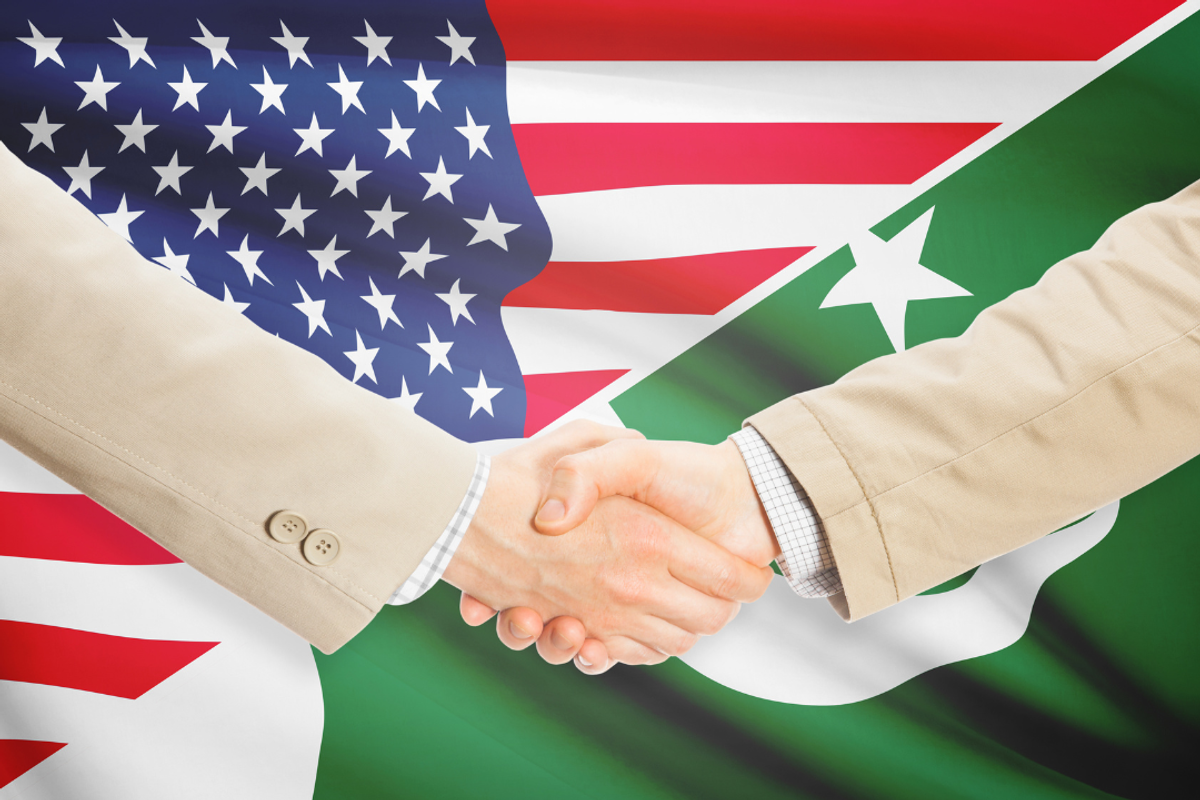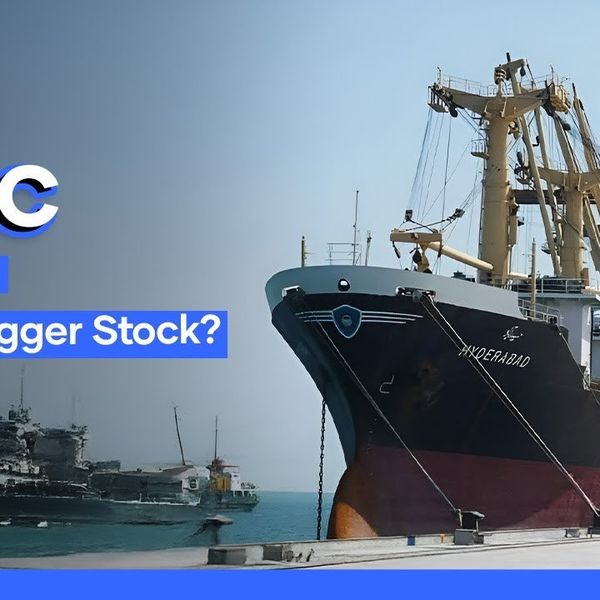What do the reduced US tariffs signify for Pakistan?
The reduction of tariffs is definitely more favorable for Pakistan than India, say analysts

Haris Zamir
Business Editor
Experience of almost 33 years where started the journey of financial journalism from Business Recorder in 1992. From 2006 onwards attached with Television Media worked at Sun Tv, Dawn Tv, Geo Tv and Dunya Tv. During the period also worked as a stringer for Bloomberg for seven years and Dow Jones for five years. Also wrote articles for several highly acclaimed periodicals like the Newsline, Pakistan Gulf Economist and Money Matters (The News publications)

Shutterstock
When it comes to Pakistan’s economy, optimism can be hard to find. And yet, the air has been heavy with optimism since Wednesday night when a new trade deal was concluded between Pakistan and the United States.
The announcement, made via Trump’s social media platform Truth Social, signals a significant pivot in U.S.-Pakistan economic ties. “We have just concluded a deal with the country of Pakistan, whereby Pakistan and the United States will work together on developing their massive oil reserves,” Trump wrote. He added, in his signature style, “Who knows, maybe they’ll be selling oil to India someday!”
The Pakistan stock market celebrated the development with appreciable gains, analysts rejoiced, and people cheered.
But what does this deal mean for Pakistan? Nukta explains.
Pakistan in a relatively better position than India
Chairman KTrade Securities Ali Farid Khwaja said that while full details of the deal have not been revealed, the tone and wording of the social media posts by President Trump and related announcements by Pakistan government leaders suggest that it is favorable.
In any case, the reduction of tariffs is definitely more favorable for Pakistan than India—which has seen the initial tariff reduced by only one percentage point—because it makes Pakistani exports relatively cheaper than India's, potentially leading to a greater chance of winning the market share.
This is broadly very positive for the Pakistani economy in general and the export-based sectors such as textiles in particular.
“Indeed, President Trump's comment about U.S. investment in Pakistani oil and gas exploration sector is most exciting and promising. Energy and mining seem to be the highest priority sectors for the U.S. government. This is a big achievement of the Pakistani government,” Khwaja said.
Pakistani officials appear to have pulled off a miracle. They were able to not only bridge the trust gap with the U.S. but turn the government completely in their favor.
This is a huge win for Pakistan and its economy will reap the rewards. In the past, for many years, U.S. policy had become too India-focused, maybe influenced by the Indian diaspora. President Trump's Middle East and Central Asia focus seems to have helped Pakistan.
“Also, India's support of Russia has been called out by President Trump,” Khwaja pointed out.
The KTrade chairman was of the opinion that Pakistan's “iron brother” China would appreciate stronger Pakistan-U.S. relations as well.
“China has never believed in confrontation. The Chinese were the largest investors in the U.S. economy. China prefers a symbiotic trade-based relationship. This helps Pakistan,” the chairman said.
This is a massive opportunity for Pakistani businesses that can capitalize on it, he added.
“This deal could be a game-changer for Pakistan,” an analyst from a leading brokerage house commented. “Foreign direct investment in energy exploration not only brings in capital but also strengthens Pakistan’s regional relevance. It’s the kind of confidence boost the economy desperately needs.”
Other experts highlighted the broader economic ripple effect. “It’s not just about oil—it’s about opening doors. U.S. partnerships can unlock access to technology, infrastructure, and new trade corridors,” a senior economist added.
Trade realignment and diplomatic signals
The deal comes amid the Trump administration’s sweeping overhaul of global trade policies, with similar bilateral efforts underway with other nations. Trump stated that his government is “very busy” finalizing trade agreements aimed at reducing the U.S. trade deficit and repositioning the country’s manufacturing base.
The Pakistan deal is expected to feature prominently in ongoing U.S.-Pakistan trade negotiations, which officials from both sides say are nearing conclusion. Finance Minister Muhammad Aurangzeb is currently in Washington to iron out final details of a broader trade agreement, while Foreign Minister Ishaq Dar confirmed last week that both countries are “very close” to a finalized deal.
Tax incentives pave the way
In a move seen as aligning with U.S. expectations, Pakistan’s Federal Board of Revenue recently exempted foreign tech companies from a 5% tax on digital goods and services, a gesture interpreted by observers as a goodwill signal to Washington.
“This shows that Islamabad is serious about modernizing its trade ecosystem and attracting global partners,” an analyst noted. “It’s a strong message of reform and readiness.”
Strategic and geopolitical implications
Beyond economics, the energy collaboration could reshape regional dynamics. Trump’s offhand comment about Pakistan exporting oil to India carries strategic undertones, particularly at a time when U.S.-India relations are strained due to trade disputes and defense procurement disagreements.
Analysts suggest the partnership could elevate Pakistan’s profile in regional energy diplomacy, giving it a platform to play a more active role in South Asian economic integration.
As Islamabad and Washington inch closer to a formal trade agreement, eyes remain fixed on what could become a landmark moment in Pakistan’s economic revival story.
“A trade deal that lowers U.S. tariffs specifically for Pakistan, compared to competing countries, would make Pakistani exports far more competitive, boosting demand and improve exporter’s earnings,” said Abdul Azeem, head of research at Al-Habib Capital Markets.
At the same time, the U.S. commitment to invest in Pakistan’s exploration sectors could help increase domestic oil production, which would reduce Pakistan’s reliance on expensive energy imports and ease pressure on the external account. Together, these steps could strengthen Pakistan’s trade balance, support industrial growth, and attract broader investment into the economy.
Ali Nawaz, CEO of Chase Securities, said that the Pakistan-U.S. agreement centers on a strategic trade and energy partnership, with a particular focus on the development of Pakistan’s untapped oil reserves across Balochistan, Punjab, Sindh, and KP.
While formally termed a trade deal, the substance lies in U.S. assistance to explore and extract these reserves, accompanied by a mutual reduction in tariffs, potentially enhancing Pakistan’s access to the U.S. market, he said.
Though not structured as a formal GSP program, this move is expected to benefit key export sectors like textiles, minerals, and IT. Additionally, Pakistan’s finance ministry has indicated broader cooperation areas, including digital infrastructure, mining, and even cryptocurrency.
This agreement may also unlock significant U.S. investment in Pakistan, particularly in energy, IT, and mining, offering a potential boost to domestic infrastructure and climate-resilient development. Given Pakistan’s $12 billion annual oil import bill, even partial success in domestic oil development could reduce dependency and ease external account pressures, Nawaz said.
Strategically, the deal aligns with broader U.S. goals in South Asia, particularly in light of its shifting rivalry with China and recent trade tensions with India.
By engaging Pakistan through economic levers—tariff relief and investment—Washington appears to be recalibrating its regional approach, favoring transactional diplomacy over security-heavy frameworks. President Trump’s suggestion that Pakistan could “sell oil to India” in the future hints at a broader vision of economic interdependence shaping new regional dynamics, according to the CEO.










Comments
See what people are discussing